
Just over three years ago, Eva and her father received the news nobody wants to hear. Tommy Chye was diagnosed with metastatic prostate cancer and Eva became his primary carer. This is Eva’s story.
Dad was really good at making sure he went for his annual medical check-up with the GP. One year, because of an overseas trip, he missed the usual appointment and the next time he went in to see the GP, they discovered something troubling. Referral to an oncologist followed and Dad was diagnosed with prostate cancer. This diagnosis came completely out of the blue and was a real shock to the family. Becoming Dad’s primary carer would turn out to be my lived experience of cancer. I hope to turn my experience into one that makes it easier for other people who are going through cancer or supporting a loved one with cancer.
We started out by choosing a set of specialists at a hospital we thought would serve our needs well. As things progressed, however, I became less certain that Dad was getting the treatment he needed. We also found that services were not co-located and the logistics of managing his care and treatment were complex. While his specialists at this hospital were kind and told us repeatedly not to worry, a niggling feeling led me to share Dad’s scans with an oncologist friend over East who confirmed that the cancer had spread. Shaken by this news, I realised I needed to move Dad to a one-stop-shop hospital, where he could get more intensive, specialised care and treatment. The cancer had metastasized from his prostate to his spine and lungs, and he needed a combination of radiation and chemotherapy to manage the disease.
I must say that everyone at Sir Charles Gardiner Hospital and Silverchain who looked after my Dad and I as he battled the final stages of his cancer were incredible. They all cared so much for each and every patient and were so committed to their profession. From the doctors and nurses through to the support care staff such as physios and OTs; from the facilities team who move patients around in their beds and the lady who took the meal orders each day, to the pharmacist who would patiently explain the 27 medications Dad would have to take at home; they were all amazing. This journey shown me how fortunate we are to have such knowledgeable, compassionate staff in our health care system, all of whom work in very difficult circumstances and often with limited resources, especially during the pandemic. Dad was able to spend quite a lot of time at home. I am so grateful to them.
For the last four months of his life, Dad was mostly in hospital. Visit restrictions because of COVID made things more difficult and stressful. But Dad, stoic and beautiful throughout, used the time he spent in hospital as an opportunity to provide mental support to younger cancer patients. Even though he was still relatively young at 73, he had lived a full and active life, building his own thriving timber export business. The young people battling cancer hadn’t had the same chance as him, their ability to live normal lives cut short by illness, and he got a lot out of being a support to them. Giving to the very end, Dad is still giving now, having donated his body to medical research.
Dad passed away in March 2022. Every last ounce of his energy was focussed on waiting for the borders to open so that my brother and his family, who live in Melbourne, could come to Perth. It was Dad’s last wish to see them. We were blessed to be able to spend Dad’s final week at the family home, with all three generations under one roof.
Whilst Dad’s will was incredible, it would not have been possible without the support of the palliative care team at Sir Charles Gardiner Hospital. They did everything they could to care for Dad when things were unpredictable at so many levels.
The last thing I should mention is Voluntary Assisted Dying. Dad had investigated this option. At a time when Dad had no control over anything, much less his own life, this option was the only thing he could control. The way the VAD team went about discussing the subject matter with Dad and me, giving us all the information and support we needed, and simply being a listening ear for Dad – well, I wish I have the right words to describe their importance. Dad passed away naturally in the end, but the emotional comfort provided by the VAD team could not be understated.
When I think about my journey as Dad’s carer what really stands out to me is how beneficial it was to have most of what we needed in one place. If WA had a comprehensive cancer centre, not only would it mean a fantastic new resource with everything patients and their families need co-located, but it would also mean more resources for a health system in desperate need of them. Having a specialised hospital for all these dedicated cancer specialists to work in would help them do the best job they could do, and that can only benefit future cancer patients.
My advice to people navigating this journey themselves, both as a patient and as a carer, is to have someone guide you and help you discover what you don’t know. By your side, you need someone who gives you the courage to stand up and question medical advice, someone who says that it’s ok to ask questions and tells you what questions to ask. This resource is essential, and I would love to see something like that available at a comprehensive centre.
